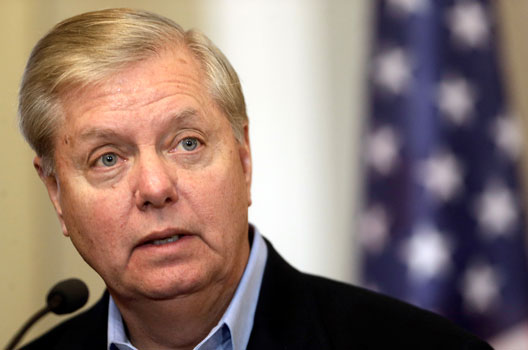 In order to end the war on terror and attain a lasting peace in the Middle East, as well as protect US security interests, Donald Trump’s administration must invest in long-term solutions, or face the consequences down the road, Sen. Lindsey Graham (R-SC) said on January 10.
In order to end the war on terror and attain a lasting peace in the Middle East, as well as protect US security interests, Donald Trump’s administration must invest in long-term solutions, or face the consequences down the road, Sen. Lindsey Graham (R-SC) said on January 10.
“To protect what we have here, we have to work toward solving problems abroad,” said Graham. “I’m trying to convince the new administration and my Republican colleagues that we’re going to pay now, or we’re going to pay later.”
In consideration of his priorities, Graham said, “I realize if you adopt my foreign policy views, there will be consequences.” However, he said, “Trump has tweeted himself into a red line,” from which he cannot back down. The United States must show strength, and in response, US adversaries will back down, he said, because they know they cannot win a war with the United States.
Graham spoke at a conference—“Passing the Baton 2017”—that was co-hosted by the Atlantic Council, the United States Institute of Peace, the American Enterprise Institute, the Carnegie Endowment for International Peace, and the Heritage Foundation.
Ultimately, Graham asserted that “America has to figure out what it’s doing,” and develop a comprehensive strategy for its role in the Middle East. Graham said that there must be a coherent and concerted effort to determine how the United States will help combat the Islamic State of Iraq and al-Sham (ISIS), end the war on terror, and continue to support the devastated countries in the wake of conflict. Trump “must determine what does it take to win the war and what is our role,” he said.
“When you get attacked, you need to respond, but you need to respond in a way that you don’t get attacked again,” he added. Graham argued that investing in the Middle East is ultimately in the best interests of the United States, but “it’s been hard for Americans to wrap their heads around what we’re doing.” In particular, “it’s pretty hard right now, in this environment, selling staying power.” He emphasized the need to sell the idea of national engagement to the American people.
Ultimately, according to Graham, winning the war on terror would mean that authorities in the region can take care of themselves, and the people have something to live for rather than die for. “The worst nightmare for radical Islam is [for the United States] to get to the country before they do, [and] invest in the lives of the young people before they can corrupt their lives.”
“They’re selling a glorious death,” he said, “we’ve got to sell a hopeful life.”
The prospects for a hopeful life go hand in hand with a renewed economy. As ISIS is driven out of Mosul, Ramadi, Fallujah, and Raqqa, the economies of these cities are devastated. Proposing the idea of a Marshall Plan for the region, Graham questioned whether Trump would be willing to provide a residual force and invest in the broken economies of these cities. He said that if Trump pulls US troops and funds, “he will get the same result as last time,” referring to US President Barack Obama’s decision to withdraw US troops from Iraq in 2011. “If Trump is unwilling to maintain support the day after, he has lost sight of the point of winning the war,” said Graham.
Trump has expressed an interest in working with the Kremlin to destroy radical Islam. However, according to Graham, this will only lead to the destruction of moderate forces. “They’re not destroying radical Islam; they’re destroying the moderate forces that are trying to liberate the country from [Syrian President Bashar al] Assad,” the senator said, referring to Russia’s actions in Syria.
Graham called for Trump to take a strong stance against Russia, particularly in light of the recent intelligence report claiming that Putin ordered the Russian cyberattack on Democratic National Committee servers. E-mails from John Podesta, Hillary Clinton’s campaign manager, were given to WikiLeaks, which then published the information. “The president-elect talks all around this,” Graham said.
The senator said that the election outcome was not affected by the hack, but Russia’s direct interference in a US election needs to be addressed. “President Trump has to decide how to deal with Russia. I have decided. We’re going to show strength,” he said.
Trump has expressed a desire to improve relations with the Kremlin, however, “the only way a better relationship with Russia occurs is if they change, not if we give in more to their bad behavior,” said Graham.
In light of the United Nations (UN) vote condemning Israel’s settlements in the West Bank, Graham has introduced a resolution in Congress to suspend funding to the world body until it corrects the problems with the Israel resolution. Expressing his support for Israel and condemnation of violence by the Palestinians, Graham insisted “we’re going to have a new conversation.”
Graham predicted that Putin and ISIS will eventually fall, but what must be considered and addressed in any foreign policy and national security strategy is how much damage will be done between now and then.
Rachel Ansley is an editorial assistant at the Atlantic Council.
Image: US Senator Lindsey Graham speaks during a news conference in Riga, Latvia, December 28, 2016. (Reuters/Ints Kalnins)
